IOS Discussion on Draft New Education Policy-2019
June 20, 2019 at Institute Building, 162, Jogabai, Jamia Nagar, New Delhi
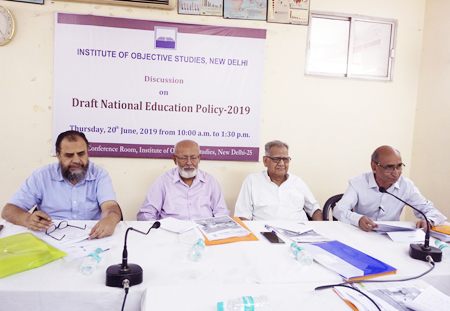
A discussion on the Draft National Education Policy-2019 was organised by the Institute of Objective Studies, on June 20, 2019, to seek opinion of stakeholders in order to be forwarded to the Ministry of Human Resource Development, Government of India till June 30, the last date for the receipt of suggestions. The IOS vice-chairman Prof. M. Afzal Wani, who initiated the discussion, said that the process of the new education policy began in 1915.
This was aimed at bringing about a paradigm shift by suggesting teacher-taught ratio and the development of a vision and understanding, among other things. He observed that the education policy should make provision for producing human resource according to qualification. He also suggested that a panel of experts drawn from different streams–social sciences, humanities, etc.— be constituted to make recommendations for necessary changes in the existing education policy.
India, being a diverse, pluralistic and peaceful society, education should define personality development and co-existence. There was a need for better utilisation of science and technology for human society. He maintained that the education policy should provide ingredients for a better society. Objectivity should be maintained to conform to international standards, he added.
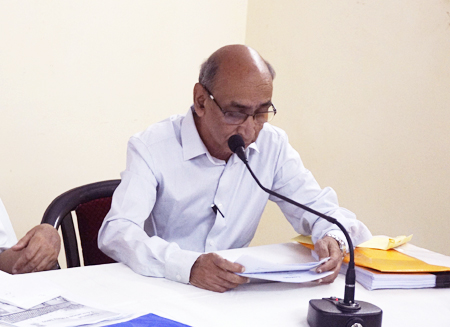
In his keynote address, educationist and ex-professor, deptt. of education, JMI, Prof. Shoeb Abdullah held that the new education policy was being publicised for several years. Terming the classification of education as artificial, he said that the same policy could not be applied to primary and higher education. However, he welcomed the proposal to start schooling at the age of three years. Laying stress on the quality of education, he said that the steps to be taken to improve quality were missing from the Draft Education Policy. Explaining the new education policy, he noted that it had been divided into four parts, viz, school education, higher education, additional key focus areas and transforming education, he said that pre-primary education was a must.
He disagreed with the proposed five years of the foundational stage: 3 years of pre-primary school and grades 1,2-3 years of the preparatory (or later primary) stage: grades 6,7,8-4 years of high (or secondary stage: Grades 9,10,11,12.
According to him, talking of 8th standard was nothing because today an 8th pass could not secure the job of even a class IV employee. Attaching 8th 9th standard with 11th and 12th standard as a part of semester system was not worthwhile. Referring to universal education, he said that it consisted of three parts-universal access, retention and quality of education, adding that without number three, the first and second were meaningless. Thus the quality of education was more important.
He raised the question over five big examinations, pointing out that due to this, it was difficult to continue school education. He said that the new education policy focused more on the outcome than on the learning process. The education policy also sought to lay stress on general education and on specialisation at the graduation level. Under these circumstances, it was difficult to collate of them. He wondered if someone was reading several subjects, how could he specialise in one subject. This would become difficult also due to the non-availability of such colleges.
Commenting on the multi-disciplinary colleges for B.Ed., he said it must mean some discipline. If one subject was taught, then other subjects could not be on a par with the former. With regard to the proposal for vocational education, he said that a student could not attain specialisation in it. On teacher education he said that the course for teachers from one year to four years did not specify the status of a teacher who completed a four-year course.
He called for a higher pay-scale for a teacher who completed the 4-year course. Or else, nobody could stop the pass-outs from being ‘B’ grade teachers. Under the new scheme, autonomy universities had been compromised. Universities would henceforth be forced to generate their own resources. To cap it all, a board would be in place to oversee the functioning and superintendence of the universities. It was not yet known as to who would be on the proposed board. He remarked that now no university would have its own parameters as somebody else would decide the matter. Identity of a university had thus been ignored he concluded.
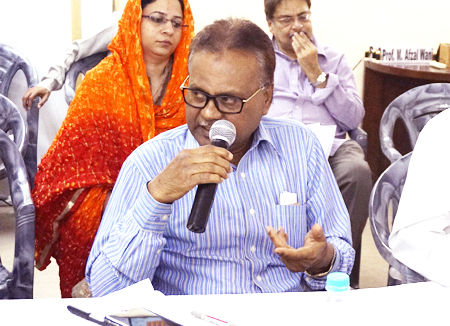
Prof. Eqbal Hussain, Faculty of Law, JMI, suggested that invention-created knowledge should be given a push, adding that universities were already providing newer things. Prof. Ilyas Husain, department of educational studies, faculty of Education, JMI, echoed similar views. Convenor, Right to Education Forum, Ambrish Rai, questioned the rationale behind bringing education upto 8th standard under the RTE (Right to Education).
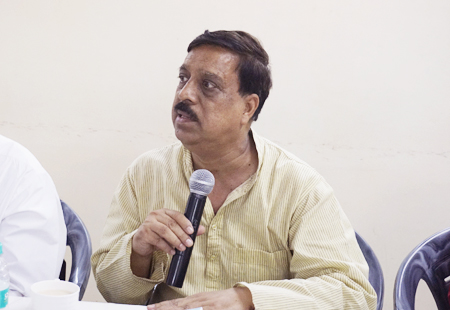
Co-locating of Aaganwadis with primary schools would create problems as they were not expected to give regular education. Holding that funding was the fundamental issue, he said that the education policy was guided by the prevailing political propensities. Here also the intention was clear as only 2.7 per cent of GDP was being proposed to be spent on education. He observed that if the states refused to fund the universalisation of education scheme, it would be imprudent to put the burden on PSUS (Public Sector Undertakings).
He said that education was being centralised by appointing the National education Commission. Headed by the Prime Minister, the proposed Commission would have direct interference of the PMO. Higher education was destined to suffer as only 15,000 colleges would be allowed to function, with each college having a minimum of 5,000 students. He noted that school education was being centralised by way of opening more and more model schools.
This went against the spirit of RTE which said that new schools should be opened. It was a matter of deep concern that as many as about 1.5 lakh schools had been closed down and multinational companies were making a beeline to come to India for opening schools. He said that India had emerged as a big market for education. This was the corporatisation of education, he insisted.
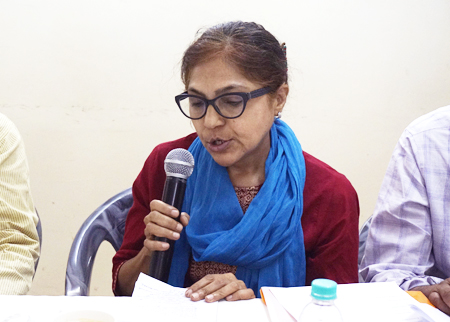
Education consultant Naaz Khair regretted that the requirement under Section 12, 1-C was not being fulfilled in about 50,000 private schools with a strength of 80 lakh students. She said that several states, including UP, had not filled the reserved quote of OBCs in admissions in schools. Even in the minority institutions, the OBC quota was not being filled. She noted that the present political dispensation wanted to discourage coaching institutions. Instead, they wanted to encourage model schools in the name of pathshalas, she said.
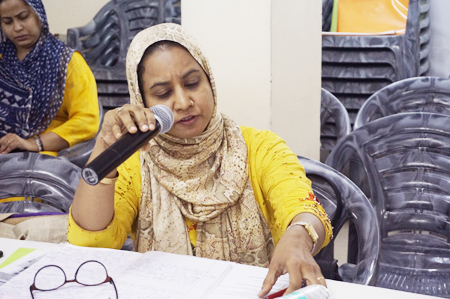
Qazi Ferdaus ul Islam from education faculty, JMI, welcomed the policy and said that it was drawn from the previous one. She held that by promoting private schools, the state was shirking its responsibility towards making India educationally empowered. Responsibility devolved on government to provide necessary resources and infrastructure for educating the country.
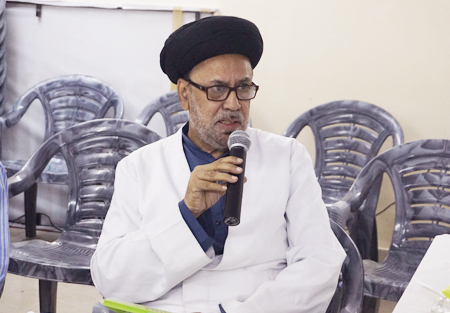
Prof. S. Ali Mohammad Naqvi, faculty of Shia theology, AMU, pointed out that the policy should be thoroughly gone into. While suggesting that the new education policy should be looked at from the minority prism, he said that there was an ideological orientation in the centralization of education.
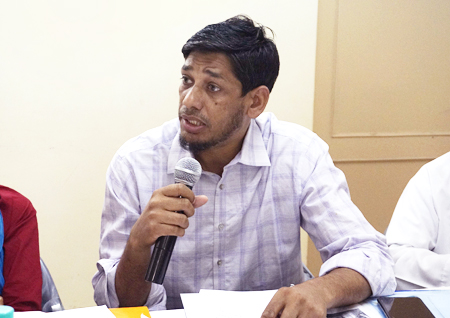
General Secretary, Federation of Muslim Educational Institutions of India, Jamaat Islam-i-Hind, Inamur Rahman, informed that the Jamaat was already seized of the matter and in this connection a meeting of 8 organisations had been called on June 23 to take stock of the situation. He described the draft policy as a tailor-made document to suit a particular ideology. He said that the government had cleverly steered clear of its responsibility to fulfill the basic need of the people. The policy was aimed at marketing education, he remarked.
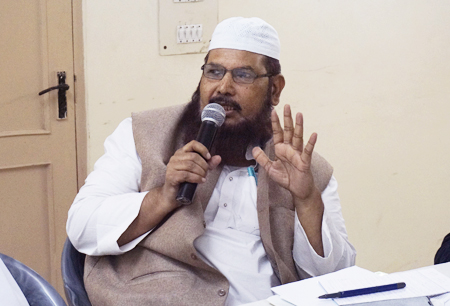
General Secretary, All India Muslim Majlis-e-Mushawarat, Maulana Abdul Hameed Noumani, observed that the new education policy was a deliberate attempt to reverse a process that intermittently continued for years by bringing Savarkar and Golwalkar into the realm of education. They were trying to foist a particular ideology on the people by re-inventing facts. History was being distorted to glorify Shivaji as an ideal. Instead of calling him a robber, they declared Mahmud of Ghazna and Babur as aggressors and plunderers. He said that the saffron ideology had gone too far to defeat Ambedkarism by creating hurdles before the SC/ST communities. Absence of resistance to activities of the saffron brigade had further emboldened them to communalise the atmosphere. Intellectuals were so frightened that they hardly reacted to ghastly incidents that took place at regular intervals. Though there were several ideologies, the ideology of nationalism had superseded all of them. He said that under the prevailing circumstances, historical aspect of the issue should be highlighted.
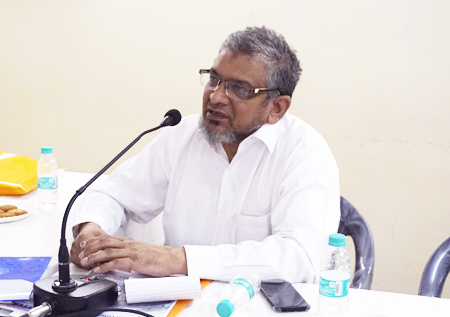
President of All India Muslim Majlis-e-Mushawarat Navaid Hamid said that it was a matter of grave concern that 10 profit-making PSUS were being privatised. Proposal to ask the PSUS for funding educational institutions was a deft ploy to privatise school education to the detriment of poor sections who could not afford to send their wards to costly schools. He warned that Muslims would suffer most if the three-language formula was scrapped. He appealed to the Ministry of Human Resource Development to extend the last date for suggestions on the draft education policy beyond June 30 next so that the stakeholders could discuss the issue more deeply.
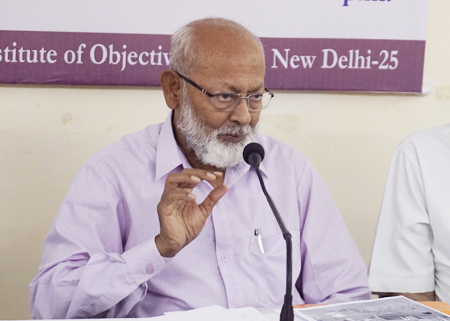
The chairman IOS Dr. Mohammad Manzoor Alam remarked that the Institute had already published a book on saffronisation of education during the A.B. Vajpayee regime. Commenting on the proposed education policy he said that it was a move to implement the saffron agenda through education. If the policy was enforced in its present form, the minorities would be the worst sufferers. He urged all stakeholders to take the policy seriously and discuss it among themselves. He said that after receiving the suggestions and inputs from the participants, a three-member committee would be formed to go into them and prepare a memorandum to be forwarded to the HRD ministry.
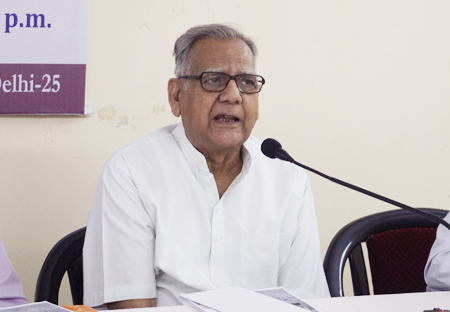
Secretary General IOS Prof. Z.M. Khan, who presided over the meet, described the document as highly communal. If the provisions of the new policy were implemented, not only Muslims, but also we, the citizens, would suffer. Every attempt was now being made to dump the national credo “unity in diversity.” This credo had shaped our thought processes, which was at the heart of India’s heterogeneity. “Live and let others live” had been India’s age-old tradition. Though the forces of doom had got empowered, they might not successes in their designs to thrust a particular ideology on the people. Their manpower and manoeuvres would not hold them for long. He called for figuring out characteristics of India as a nation.
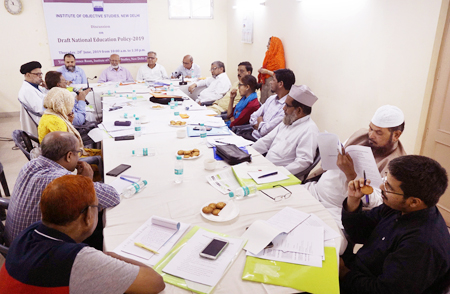
Earlier, the discussion began with the recitation of a verse from the Quran along with its Urdu rendering by Hafiz Athar Husain Nadwi. The discussion ended with Prof. Afzal Wani extending a vote of thanks. The discussion attracted several educators, intellectuals, university teachers, NGOs, etc.
Go Back